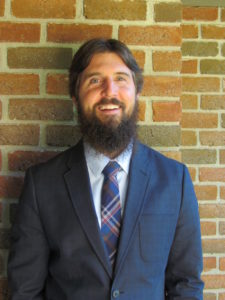
Matthew Young | Courtesy
Those who don’t know him might recognize Associate Professor of Chemistry Matthew Young as the professor who walks with his daughter across campus to preschool in the morning, often sporting a beard which rivals that of Professor of English Justin Jackson.
This year, Young also became the chair of the chemistry department, and is helping develop the new chemistry course that will be offered starting next semester as a part of the core curriculum.
Young, who joined the department in 2007, specializes in physical chemistry, which applies physics concepts to chemical systems.
He is also interested in making interdisciplinary connections between chemistry and other subjects. As an undergraduate student at Seattle Pacific University, he found chemistry interesting, but also studied philosophy.
“I was one of these people that when I came to college, I was interested in a lot of different things,” he said. “I was interested in math, and I got really interested in philosophy, and other things.”
Ultimately, he chose chemistry, and went on to Northwestern University where he earned a doctorate degree in physical chemistry.
Now as department chair, Young is integrating his interest for the liberal arts with his love for chemistry as he helps develop the new core chemistry class.
“My first goal for the department is to continue the work toward making that an excellent course,” Young said. “It will have more context for the chemistry ideas that we go over — we’re going to have more history, more connections compared to Science 101.”
Professor of Chemistry Mark Nussbaum, the former department chair of nine years, said Young will be an excellent teacher for the new course.
“He really does see chemistry as an important part of an overall education for everyone,” Nussbaum said. “As he’s said, if you’re going to have a correct view of the world, then you need to understand something about the physical nature of the world.”
Though Young found physical chemistry classes difficult course as an undergraduate student, he said he tries to make the material accessible for his students.
“I try not to make it any more complicated than it needs to be,” Young said. “We really focus on the central ideas, but a lot of it is difficult subject matter. I try to make a lot of connections to general chemistry and physics. All we’re doing is taking these ideas a little bit further.”
He’s won the Emily Daugherty Award for Teaching Excellence, awarded annually by the college, and his students said they appreciate the effort he puts into teaching a difficult subject.
“You can just tell that he prepares for his lectures very thoroughly,” Senior Eva Tang said. “He is very intelligent, but he tries to think like what a student would think to make sure we’re getting it. It’s really hard and abstract sometimes, but he’s very welcoming of questions.”
He also works with students on research projects. Tang, who worked with Young for her chemistry research this past summer, said he helped her learn the background information leading into the research and patiently answered her questions, since she had not yet taken physical chemistry.
“He explains things so well that now I feel like, ‘Oh, I think I get it, I get quantum mechanics,’ which is something that I never thought I’d say,” Tang said.

